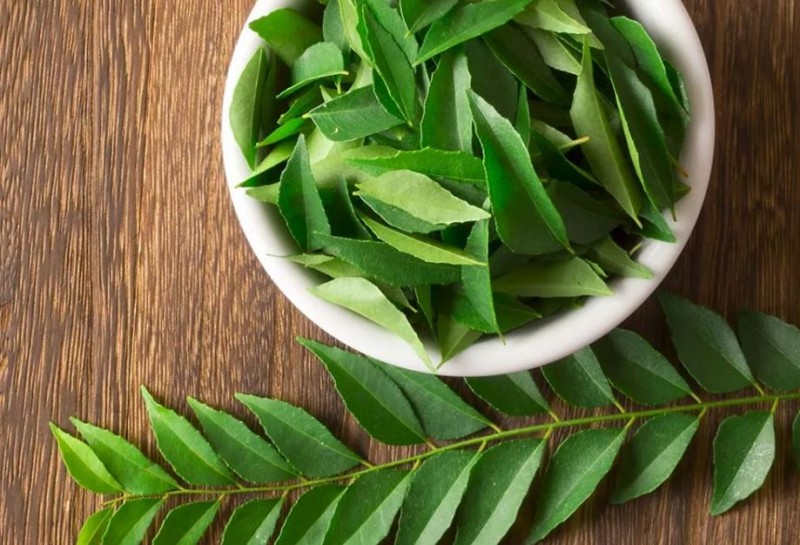
Curry leaves, commonly used in South Asian cuisine, are not only renowned for their unique flavor but also for their remarkable health benefits. These aromatic leaves, derived from the curry tree (Murraya koenigii), have been treasured for centuries due to their culinary and medicinal properties. This tree is native to India, and for both medicinal and culinary purposes, its leaves are used. They are particularly aromatic and have a distinctive taste of citrus notes. In Indian households, curry leaves, the quintessential aromatic element, have countless nutritional and therapeutic benefits. Kadi Patta or Meetha Neem in Hindi, Kariveppilai in Tamil, or Karivempu in Malayalam are known by many vernacular names as this tree is indigenous to India, Srilanka, and many Southeast Asian countries. Although this traditional spice mixture is often added and popularly used in cooking to add flavor to dishes such as curries, rice dishes, and dals, curry leaves are not the same as curry powder. They deliver an array of health benefits due to the strong plant compounds they produce, apart from being a versatile culinary herb. In this comprehensive guide, we will delve into the diverse range of health benefits that curry leaves offer and explore how they can enhance our overall well-being.
Nutritional Profile of Curry Leaves
Curry leaves are rich in essential nutrients, including vitamins A, B, C, and E, minerals such as calcium, iron, and phosphorus, and beneficial plant compounds like phenols and flavonoids. These compounds contribute to the overall health benefits associated with curry leaves.
Antioxidant and Anti-inflammatory Properties
Curry leaves exhibit potent antioxidant properties, which help combat oxidative stress and neutralize harmful free radicals in the body. The presence of antioxidants like vitamin C, vitamin E, and various phenolic compounds contributes to their protective effects against chronic diseases.
Moreover, curry leaves possess anti-inflammatory properties that can help alleviate inflammation throughout the body. The active compounds found in these leaves, such as mahanimbine, exhibit anti-inflammatory effects, potentially reducing the risk of chronic inflammation-related conditions.
Digestive Health
Curry leaves have long been valued for their positive impact on digestive health. They possess carminative properties that aid in relieving digestive discomfort, including indigestion, bloating, and constipation. The leaves stimulate the secretion of digestive enzymes, promoting efficient digestion and nutrient absorption.
Additionally, curry leaves exhibit antimicrobial properties that can help combat harmful bacteria in the digestive tract, promoting a healthy gut environment. Their consumption has also been linked to the prevention of peptic ulcers and the reduction of gastrointestinal inflammation.
Diabetes Management
Curry leaves have shown promise in managing diabetes. Research suggests that these leaves can lower blood glucose levels by influencing insulin activity, enhancing insulin sensitivity, and promoting glucose metabolism. The presence of certain bioactive compounds in curry leaves, such as carbazole alkaloids, contributes to their anti-diabetic effects.
Furthermore, curry leaves may help prevent diabetic complications by reducing oxidative stress and improving lipid profiles. Incorporating curry leaves into a balanced diet can be a natural and beneficial way to support diabetes management.
Skin and Hair Health
Curry leaves possess properties that can benefit both the skin and hair. The presence of antioxidants helps protect the skin from damage caused by free radicals, preventing signs of aging, and promoting a healthy complexion. Curry leaves can be used in topical applications or consumed internally to support skin health.
When it comes to hair care, curry leaves have been traditionally used to address various hair concerns. They can help strengthen hair follicles, reduce hair fall, and promote hair growth. The leaves contain essential nutrients that nourish the scalp and enhance the overall health and appearance of the hair.
Heart Health
Curry leaves contribute to heart health by aiding in the management of various risk factors associated with cardiovascular diseases. Their high antioxidant content helps reduce oxidative stress and prevents the oxidation of cholesterol, which can lead to the formation of arterial plaques.
Furthermore, curry leaves possess hypolipidemic properties, meaning they can help lower cholesterol and triglyceride levels. This can contribute to the prevention of conditions like atherosclerosis and hypertension.
Curry leaves, with their exceptional nutritional profile and a myriad of health benefits, deserve recognition for their remarkable impact on our well-being. From aiding digestion and managing diabetes to promoting heart health and enhancing skin and hair, these leaves offer a natural and holistic approach to health and vitality. Consider incorporating curry leaves into your culinary repertoire or exploring their potential in herbal remedies to harness their incredible benefits and optimize your overall wellness. Embrace the power of curry leaves and unlock a world of health and flavor.
Asafoetida: Unveiling the Health Benefits of a Unique Spice
The Green Gold: Exploring the Benefits of Green Cardamom
Indian Cuisine and food culture